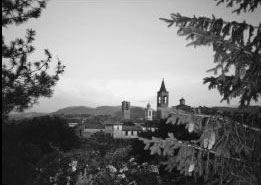The Month of a Lifetime
By Betty Gabrielli
Every summer for the past 10 years Conservatory professor Daune
Mahy has been leading Oberlin students to Italy. All of them find
the trip unforgettable, and, for most, the experience has proved
invaluable.
 "They were just like fans waiting to get into a rock concert or
a baseball stadium, but this was opera!" recalls junior voice
major Erica Salinas of La Scala's lottery, in which hundreds of
people write their names on slips of paper, then mill about the
opera house's plaza for hours, hoping their slip will be drawn.
"Some were anxious, almost hysterical. Some cried when their names
weren't called. The ones who did get tickets, they screamed and
laughed and danced."
"They were just like fans waiting to get into a rock concert or
a baseball stadium, but this was opera!" recalls junior voice
major Erica Salinas of La Scala's lottery, in which hundreds of
people write their names on slips of paper, then mill about the
opera house's plaza for hours, hoping their slip will be drawn.
"Some were anxious, almost hysterical. Some cried when their names
weren't called. The ones who did get tickets, they screamed and
laughed and danced."
Salinas was in Milan last summer with others enrolled in the Oberlin-in-Italy
program, which celebrated its 10th anniversary this summer. The
program was the brainchild of Oberlin voice professors Daune Mahy
and Gerald Crawford, who spent several months studying in Urbania
at the Centro Studi Italiani (CSI), a language school affiliated
with the Societa Dante Alighieri.
Most intensive language-study programs do not offer vocal coaching,
and the professors thought such a combination would be invaluable
for young singers. And CSI's proximity to Italy's important singing schools and opera theaters, coupled with Urbania's rich history
and beautiful countryside, made it a perfect partner for academic
collaboration with Oberlin. CSI director Carlo Pasotto agreed,
and the new program was launched. Oberlin-in-Italy singers are
coached by Mahy and Italian Maestro Carlo Morganti in the Italian lyrical style. Nineteen hours a week of grammar, syntax, and vocabulary classes are bolstered by daily contact with Urbania residents,
who open their homes and hearts to visitors.
"It's a total blitz," remembers Jennifer Wamsley '93, who went
to Urbania in 1991 and is now the conservatory's assistant director
of opera theater. "As a singer, I really needed to work on my Italian. Living with a family there, I picked up more of the language in a month than I could have in a semester-long class."
Vocalists and instrumentalists in the program have traditionally
given a Gala Concert at the conclusion of the course. This summer,
in celebration of the anniversary, Mahy expanded the performance
component, adding Puccini's one-act chamber opera Suor Angelica
and two in-house concerts.
Above: Surrounded by the mountains and gentle foothills of central Italy, Urbania was, from the 15th to the 18th centuries, the country residence of the Dukes of Urbino.
Photos courtesy of Daune Mahy.
 "They were just like fans waiting to get into a rock concert or
a baseball stadium, but this was opera!" recalls junior voice
major Erica Salinas of La Scala's lottery, in which hundreds of
people write their names on slips of paper, then mill about the
opera house's plaza for hours, hoping their slip will be drawn.
"Some were anxious, almost hysterical. Some cried when their names
weren't called. The ones who did get tickets, they screamed and
laughed and danced."
"They were just like fans waiting to get into a rock concert or
a baseball stadium, but this was opera!" recalls junior voice
major Erica Salinas of La Scala's lottery, in which hundreds of
people write their names on slips of paper, then mill about the
opera house's plaza for hours, hoping their slip will be drawn.
"Some were anxious, almost hysterical. Some cried when their names
weren't called. The ones who did get tickets, they screamed and
laughed and danced."